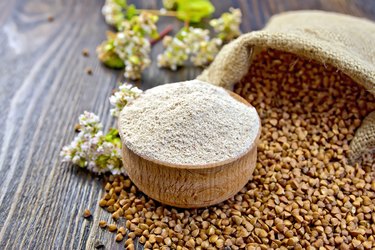
Buckwheat nutrition data shows that buckwheat flour has many benefits that you may want to take advantage of. This whole grain packs loads of protein, fiber, vitamins and minerals, and antioxidants into each serving.
Tip
Buckwheat flour can provide a nutritious, gluten-free alternative to wheat flour.
Video of the Day
Not only does buckwheat flour offer a nutrient packed alternative to bleached white flour, but buckwheat provides a gluten free alternative to wheat flour.
Video of the Day
Buckwheat Nutrition Data
Buckwheat is full of nutrients that are important for overall-health and vitality. According to the USDA, buckwheat has the following nutrients per 3.5 ounces:
- 335 calories
- 12.6 grams of protein
- 3.1 grams of fat
- 10 grams of fiber
- 71 grams of carbohydrates
Read More: 10 Best New Gluten-Free Foods
Buckwheat Carbs
Buckwheat offers a high amount of total carbohydrates. But if you are concerned about your blood sugar levels, don't be. Buckwheat scores low on the glycemic index (GI). The GI measures how quickly your body absorbs carbohydrates. The lower the score, the slower your blood sugar levels rise.
Foods like buckwheat flour that are low on the GI won't cause a spike in your blood sugar levels. If you are living with diabetes, buckwheat flour is a safe food to eat to help keep your blood sugar regulated naturally.
And, the benefits of keeping a low GI diet is beneficial for everyone. According to the Grains & Legumes Nutrition Council, a low GI diet can help decrease cholesterol, reduce inflammation, reduce risk of certain cancers, help regulate insulin levels, and reduce abdominal body fat.
Read More: How Long After Eating Does Blood Sugar Peak?
Buckwheat is Full of Protein
A part of buckwheat's calories come from protein. The recommended daily allowance for protein intake is .8 grams per kilogram of body weight according to Harvard Health. To find your own RDA, you would need to multiply your body's weight in pounds by 0.36. The resulting number will tell you how many grams of protein you need each day to stay healthy.
Perhaps more impressive, the protein found in buckwheat is a complete protein according to the Whole Grain Council. This means it contains all the essential amino acids that make up a full protein in the body.
However, according to the Whole Grains Council, there is some evidence that the protein found in buckwheat may be difficult to digest. This may mean buckwheat is not a suitable source of protein for people with digestive issues and growing children. But for everyone else, it can provide part of a person's daily protein needs.
Read More: 3 Easy Ways to Get Enough Protein Throughout the Day
Buckwheat Contains Minerals and Antioxidants
Buckwheat is an excellent source of minerals and antioxidants. If you are looking to increase your mineral intake, buckwheat flour can help. Buckwheat flour is high in:
In addition, the minerals found in buckwheat are easy to absorb. Unlike some other grains, buckwheat flour contains very little phytic acid. According to an April 2014 study published in the Journal of Food Science and Technology, phytic acid blocks the absorption of minerals.
According to a January 2014 study published in the journal Hemijska Industrija, buckwheat flour is high in two types of antioxidants: polyphenols and tocopherols, particularly in rutin. A January 2015 study published in the EXCLI Journey indicates that rutin provides antibiotic, antimicrobial, and antifungal properties. In addition, it may help with chronic diseases including helping to treat cancers, diabetes, and hypertension.
Read More: High Antioxidant Fruits & Vegetables
Buckwheat is Gluten Free
Despite the name, buckwheat is not related to wheat typically used to make your favorite pastas, bread, and desserts. Instead, buckwheat is a whole grain that comes from what is known as a pseudo cereal. Pseudo cereals are grains that you consume like a cereal but don't grow on grass. Because buckwheat flour does not contain wheat, it does not contain gluten.
However, you should use caution when shopping for buckwheat flour and products made with buckwheat flour if you are trying to avoid gluten. Check the label to make sure that the flour contains only buckwheat flour, otherwise it may contain gluten.
- United States Department of Agriculture Agricultural Research Service: "Buckwheat Flour, Whole-groat"
- Whole Grains Council: "Buckwheat - December Grain of the Month"
- Grains and Legumes Nutrition Council: "Glycemic Index (GI) of Grains"
- Journal of Food Science and Technology: "Reduction of Phytic Acid and Enhancement of Bioavailable Micronutrients in Food Grains"
- EXCLI Journal: "An Up-to-date Review of Rutin and Its Biological and Pharmacological Activities"
- Hemijska industrija: "Antioxidant Properties of Buckwheat Flours and Their Contribution to Functionality of Bakery, Pasta and Confectionary Products"
- Harvard Health: "How Much Protein Do You Need Every Day?"